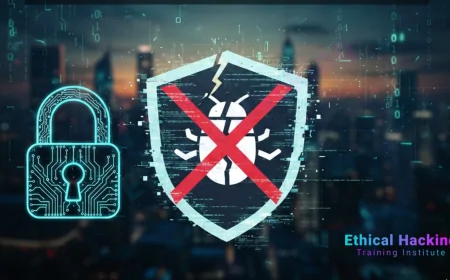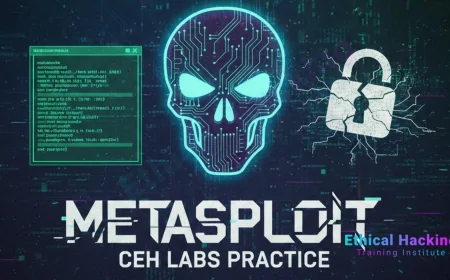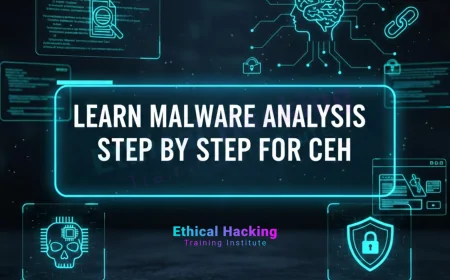CPENT Training with Placement Support | Boost Your Cybersecurity Career Today
Learn everything about CPENT Training with Placement Support — from real-world skills, certification benefits, and advanced penetration testing to career opportunities. Discover how CPENT can transform your ethical hacking career with expert-led training and job placement support.

Imagine being the last line of defense when cybercriminals launch full-scale attacks. Picture yourself running simulated exploits in live enterprise environments, bypassing firewalls, cracking hardened systems, and thinking like a real adversary—all in a legal and controlled setting. That’s the power of CPENT (Certified Penetration Testing Professional) training. But what's even better? Having placement support that connects you with companies looking for your exact skill set.
In this blog, we’ll dive deep into everything you need to know about CPENT training with placement assistance—from course structure and skill development to the career potential it unlocks.
What is CPENT and Why Is It So Unique?
The Certified Penetration Testing Professional (CPENT) is an advanced, hands-on certification designed for professionals who want to master real-world penetration testing in enterprise networks.
Key Highlights of CPENT:
-
Live cyber range simulations
-
Advanced network and web application penetration testing
-
Multi-layered attack simulations
-
OS-level exploits, buffer overflows, and privilege escalation
-
Post-exploitation and report writing
Unlike basic ethical hacking courses, CPENT doesn’t stop at theory or multiple-choice questions. It tests your practical abilities under pressure, in a 24-hour performance-based exam that replicates complex, real-world network environments.
Core Modules Covered in CPENT Training
To succeed in CPENT, candidates must master a broad spectrum of topics. The training is designed to build deep, hands-on skills.
CPENT Training Topics:
-
Advanced Windows Attacks
-
Active Directory Pen Testing
-
Bypassing Firewalls and IDS/IPS
-
Pentesting ICS/SCADA Systems
-
Fuzzing and Exploit Development
-
Wireless Network Exploitation
-
Cloud Penetration Testing
-
Binary Exploitation
-
IoT Device Exploitation
-
Privilege Escalation in Windows/Linux
-
Mobile Device Penetration Testing
The training combines video lectures, labs, and capstone projects that simulate enterprise-grade infrastructure.
Why Hands-On Labs Make All the Difference
One of the standout features of CPENT training is the cyber range lab environment. These labs are designed to simulate real-time attack-defense scenarios with multiple entry points and security configurations.
Lab Features Include:
-
Virtual machines with multiple operating systems
-
Simulated enterprise networks with segmentation
-
Web apps with hidden vulnerabilities
-
Targets for binary exploitation
-
Defensive tools for bypassing (IDS/IPS, firewalls)
These labs help you think and act like an adversary while keeping legality and ethical conduct intact.
Who Should Enroll in CPENT Training?
This is not an entry-level course. It’s for professionals who are already familiar with cybersecurity fundamentals and want to move to red teaming, penetration testing, or offensive security roles.
Suitable for:
-
Security Analysts
-
Penetration Testers
-
Network Administrators
-
Security Engineers
-
Red Team Professionals
-
Ethical Hackers with basic certifications (e.g., CEH, Security+)
Career Opportunities After CPENT Training
Having the CPENT credential and training experience gives professionals a major edge in the cybersecurity job market. The industry is desperate for offensive security experts who can think like hackers but act legally.
Post-CPENT Job Roles:
-
Penetration Tester
-
Red Team Operator
-
Threat Intelligence Analyst
-
Vulnerability Researcher
-
Exploit Developer
-
Security Consultant
-
Application Security Engineer
With companies facing escalating cyber threats, trained CPENT professionals are welcomed across sectors like fintech, healthcare, government, defense, and cloud-based services.
The Importance of Placement Support
CPENT training on its own is powerful—but pairing it with strong placement support transforms your learning into a career launchpad.
How Placement Support Helps:
-
Resume Preparation: Highlighting technical proficiencies and certification achievements
-
Mock Interviews: Practicing scenario-based ethical hacking questions
-
Portfolio Building: Guidance on creating GitHub repos, blogs, or demo projects
-
Interview Matching: Connecting with companies hiring for penetration testing roles
-
Soft Skills Workshops: Communication, reporting, and client interaction training
Having placement support means you don't just gain knowledge—you gain access to opportunities.
Real-Time Scenarios and Problem Solving
What makes CPENT even more exciting is the scenario-based problem-solving model. You're placed in real-time simulated crises like:
-
Responding to APT-style intrusions
-
Testing segmented networks under strict access controls
-
Evading detection systems during post-exploitation
-
Performing lateral movement without raising alarms
-
Compromising IoT and OT systems in a lab environment
This immersive model helps you become a true cybersecurity warrior.
Skills Gained from CPENT Training
When you complete a CPENT training program, especially with placement support, you come away with far more than a certificate.
Technical Skills:
-
Exploit development & fuzzing
-
Active Directory privilege escalation
-
Pivoting & tunneling
-
Post-exploitation scripting
-
Web app testing (SQLi, XSS, SSRF)
-
Wireless & mobile device attacks
-
Linux kernel & binary attacks
Soft Skills:
-
Incident reporting
-
Executive-level briefings
-
Clear vulnerability documentation
-
Team collaboration
-
Client communication
The blend of tech + communication makes CPENT-certified individuals ideal hires.
Common Challenges in CPENT Training
As elite as it is, CPENT isn’t a walk in the park. Here are some common challenges students face:
Challenges:
-
Time Management: The 24-hour exam tests endurance as much as knowledge.
-
Complex Labs: Requires hours of trial and error.
-
Depth of Knowledge: Requires pre-existing experience in Linux, networking, and scripting.
-
Stressful Simulations: Real-time scenarios can become overwhelming without guidance.
-
Lack of Resources: Some learners struggle without structured mentorship or support.
Overcoming these requires dedication, consistent lab practice, and guidance from experienced mentors.
Tips to Succeed in CPENT Training
Want to ace CPENT and land your dream job with placement support? Follow these golden rules:
Success Tips:
-
Master Prerequisites: Know Linux, Windows, Networking, Python, and Bash well.
-
Daily Lab Practice: Minimum 2–3 hours of lab work per day.
-
Join Forums: Engage in ethical hacking and CPENT-specific online communities.
-
Build a Portfolio: Post write-ups, GitHub exploits, and simulated tests online.
-
Simulate the Exam: Take full 24-hour practice labs to test your readiness.
-
Get Mentorship: Seek experienced cybersecurity professionals for guidance.
Global Recognition of CPENT
CPENT is vendor-neutral and globally respected. It is increasingly seen as an alternative to elite certifications like OSCP or GIAC, especially because of its hands-on focus and real-world coverage.
Recognized In:
-
Enterprise cybersecurity hiring
-
Government and defense jobs
-
Freelancing and consulting roles
-
Vulnerability research communities
-
Bug bounty and red team simulations
CPENT vs. Other Penetration Testing Certifications
| Feature | CPENT | OSCP | CEH | PNPT |
|---|---|---|---|---|
| Hands-On Labs | Advanced | Advanced | Limited | Intermediate |
| Exam Duration | 24 Hours | 24 Hours | 4 Hours | 2-3 Days |
| Level | Expert | Expert | Intermediate | Intermediate |
| Focus | Enterprise Network & App Pen Testing | Offensive Hacking | Theory-Based Hacking | Practical Pentesting |
| Placement Support | Varies by provider | No | Varies by provider | Community Based |
Why CPENT with Placement Support Is the Best Combo
CPENT is tough, intense, and rewarding. But pairing it with active placement support creates a complete training-to-career pipeline.
You’re not just learning for knowledge. You’re learning for impact, for employment, for real-world defense.
Placement support provides:
-
Job matching
-
Resume building
-
Mock interviews
-
Certification tracking
-
HR coordination
-
Internship access
This combination ensures you're not left wondering what next after the training.
FAQ's
1. What is CPENT training, and why is it important for ethical hackers?
CPENT training is an advanced penetration testing course that prepares ethical hackers to simulate real-world attacks on complex enterprise networks. It’s crucial for those aiming to elevate their skills beyond basic hacking, offering practical labs, simulated environments, and hands-on testing scenarios that mirror real cyberattacks.
2. Who should enroll in CPENT training in Pune?
Ethical hackers, cybersecurity professionals, red teamers, and network security analysts with foundational knowledge should consider CPENT training in Pune. The program is ideal for those seeking advanced skills in offensive security and looking to pursue high-demand roles with placement support in growing IT hubs.
3. What makes CPENT different from other ethical hacking certifications?
CPENT stands out by offering a 24-hour performance-based exam that mirrors enterprise cyberattack scenarios. Unlike theory-based certifications, CPENT emphasizes real-time hands-on skills like exploit development, AD penetration, and network evasion—all critical for high-level ethical hacking careers.
4. What job roles can CPENT-certified professionals apply for?
CPENT-certified professionals are qualified for roles such as Penetration Tester, Red Team Operator, Application Security Engineer, Security Consultant, and Threat Analyst. Ethical Hacking Training Institutes in Pune with placement support help align candidates with cybersecurity roles in top organizations.
5. Is CPENT training suitable for beginners in cybersecurity?
No, CPENT is not intended for beginners. It is an expert-level certification designed for professionals who already have a strong foundation in ethical hacking, Linux, networking, and scripting. Beginners should complete basic ethical hacking certifications before attempting CPENT.
6. What are the benefits of enrolling in a CPENT course in Pune?
Enrolling in a CPENT course in Pune offers access to a growing cybersecurity ecosystem, live cyber ranges, and industry-grade labs. Combined with placement support, learners benefit from local hiring connections, hands-on practice, and structured mentorship for career advancement.
7. How does placement support help after CPENT training?
Placement support includes resume building, mock interviews, career counseling, and access to recruiter networks. Ethical Hacking Institutes in Pune often have direct ties with hiring partners, boosting your chances of landing high-paying cybersecurity roles soon after certification.
8. What skills will I learn in CPENT training?
You’ll learn binary exploitation, fuzzing, privilege escalation, web and network penetration testing, mobile hacking, and cloud-based security testing. These practical skills prepare you to work in offensive security teams and tackle real-world vulnerabilities in complex systems.
9. How long does it take to complete CPENT training?
Most CPENT training programs run for 8 to 12 weeks, depending on the pace and mode of delivery (weekend or weekday batches). Institutes in Pune typically offer flexible learning options to suit working professionals and full-time students.
10. Are there any prerequisites for CPENT training?
Yes, you should have prior experience in ethical hacking, knowledge of Linux, Windows environments, basic scripting (Python or Bash), and networking fundamentals. Some Ethical Hacking Institutes in Pune may also require completion of a foundational certification like CEH.
11. Does CPENT training include live labs and real-time simulations?
Absolutely. CPENT training includes advanced labs that replicate enterprise environments. These labs involve multi-layered networks, web apps, hardened systems, and simulated attack surfaces to help learners build real-world penetration testing experience.
12. What is the format of the CPENT certification exam?
The CPENT exam is a 24-hour hands-on practical exam, divided into two 12-hour sessions. You’ll be tested in a live cyber range with real-time scenarios involving exploitation, post-exploitation, evasion, and reporting.
13. How does CPENT training enhance my cybersecurity career?
CPENT training positions you for top-tier cybersecurity jobs by equipping you with expert-level offensive security skills. It also boosts your resume and credibility, especially when combined with placement support from top ethical hacking institutes in Pune.
14. Can I take CPENT training online if I live outside Pune?
Yes, many Pune-based Ethical Hacking Training Institutes offer online CPENT programs with full virtual lab access, mentor support, and placement assistance. This allows you to learn remotely while still receiving job support services.
15. What is the average salary after completing CPENT with placement support?
Salaries vary based on experience, but fresh CPENT-certified professionals can earn between ₹6 LPA to ₹12 LPA. With industry demand rising, ethical hackers with CPENT credentials are securing roles with excellent growth prospects.
16. What tools are used during CPENT training in Pune?
CPENT training covers tools like Metasploit, Nmap, Burp Suite, Wireshark, Mimikatz, and custom exploitation frameworks. Institutes ensure you gain hands-on experience using these tools in enterprise-like lab settings.
17. Will I receive career counseling during the course?
Yes, most Ethical Hacking Institutes in Pune provide career counseling as part of their placement support services. This includes job readiness sessions, soft skill enhancement, and personalized career planning based on your goals.
18. Is CPENT training recognized globally?
Yes, CPENT is recognized by cybersecurity employers worldwide. It’s a high-level certification that signals advanced penetration testing skills and is often compared with OSCP or GIAC in terms of industry credibility.
19. Are CPENT training programs in Pune affordable?
CPENT training costs vary by institute, but Pune offers some of the most cost-effective training programs in India. Many institutes provide installment options, financing, or scholarship opportunities, especially for students and working professionals.
20. How do I choose the best CPENT training institute in Pune?
Look for institutes with hands-on labs, experienced mentors, active placement support, and strong student reviews. Visit demo sessions, ask about success rates, and ensure they offer post-training job assistance tailored to CPENT-certified professionals.
The Final Word on CPENT Training with Placement Support
The cybersecurity landscape is evolving rapidly—and the defenders of tomorrow must be trained today.
CPENT training is your path to becoming a skilled, elite, and certified penetration tester ready to tackle the toughest challenges in cybersecurity. With placement support, that path becomes clearer, smoother, and more career-focused.
Whether you're transitioning from blue team to red team, upgrading from CEH, or diving deep into advanced offensive tactics, CPENT training offers the skills, labs, and recognition you need.
Pair it with structured placement assistance, and you're not just certified—you're employable.
What's Your Reaction?
 Like
0
Like
0
 Dislike
0
Dislike
0
 Love
0
Love
0
 Funny
0
Funny
0
 Angry
0
Angry
0
 Sad
0
Sad
0
 Wow
0
Wow
0

















